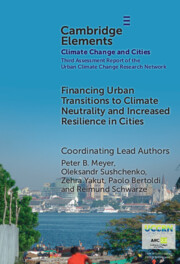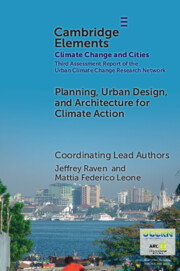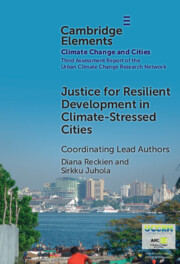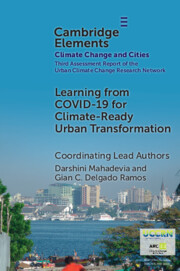Allow content?
This content requires cookies. To view content please update your cookie preferences.
About this Cambridge Elements series
Elements in Climate Change and Cities – published in collaboration with the Urban Climate Change Research Network (UCCRN) – provides readers with urban climate change knowledge, tools, and case studies to heighten opportunities for sustainability and resilience in cities worldwide. This series forms UCCRN’s Third Assessment Report on Climate Change and Cities (ARC3.3), building on the preceding ARC3.1 (2011) and ARC3.2 (2018). As an assessment of the latest research and new scientific insights, ARC3.3 explores pressing climate issues, transformative solutions, and cross-cutting themes. This series is produced by scholars from cities around the world with the ambition of helping cities further fulfil their role as climate change leaders. Each Element has innovative approaches to mitigation, adaptation, and resilience, highlighting effective strategies for urban action and transformation. The series invites readers to engage with the latest advancements, empowering researchers, practitioners, policymakers, and students to actively shape the future of urban environments.
Elements in this series
-

- Element
Financing Urban Transitions to Climate Neutrality and Increased Resilience in Cities
- Peter B. Meyer, Oleksandr Sushchenko, Zehra Yakut, Paolo Bertoldi, Reimund Schwarze, Benjamin Leffel, Pedro Ninô de Carvalho, Ahmad Garba Khaleel, Joyce Coffee, Jesse M. Keenan, William Solecki, Minal Pathak, Martha Barata, Aliyu Salisu Barau, Maria Dombrov, Cynthia Rosenzweig
-

- Element
Planning, Urban Design, and Architecture for Climate Action
- Jeffrey Raven, Mattia Federico Leone, Sanjukkta Bhaduri, Christian Braneon, David Corbett, David Driskell, Ursula Eicker, John E. Fernandez, Jing Gan, Anna Hürlimann, Ilana Judah, Michael Neuman, Barbara Norman, Dennis Pamlin, Chao Ren, Rob Roggema, Pourya Salehi, Anne Shellum, Andréa Souza Santos, Joel Towers, Cristina Visconti, William Solecki, Minal Pathak, Martha Barata, Aliyu Salisu Barau, Maria Dombrov, Cynthia Rosenzweig
-

- Element
Justice for Resilient Development in Climate-Stressed Cities
- Diana Reckien, Sirkku Juhola, Anika Nasra Haque, Heba Allah Khalil, Maria Fernanda Lemos, Shuaib Lwasa, Leila Niamir, Juan Camilo Osorio, Cristina Visconti, William Solecki, Minal Pathak, Martha Barata, Aliyu Salisu Barau, Maria Dombrov, Cynthia Rosenzweig
Allow content?
This content requires cookies. To view content please update your cookie preferences.
Principal Editor Bios:
William Solecki is a Professor in the Department of Geography at Hunter College, City University of New York (CUNY). From 2006-2014 he served as the Director of the CUNY Institute for Sustainable Cities at Hunter College. He also served as interim Director of the Science and Resilience Institute at Jamaica Bay. He has co-led several climate impacts studies in the greater New York and New Jersey region, including the New York City Panel on Climate Change (NPCC). He was a Lead Author of the Urban Areas chapter in the Fifth Assessment Report of the Intergovernmental Panel on Climate Change (IPCC), and a Coordinating Lead Author of the Urbanization, Infrastructure, and Vulnerability chapter in the Third National Climate Assessment (US). He is a co-founder of the Urban Climate Change Research Network (UCCRN), co-editor of Current Opinion on Environmental Sustainability, and founding editor of the Journal of Extreme Events. His research focuses on urban environmental change, resilience, and adaptation transitions.
Minal Pathak is an Associate Professor at the Global Centre for Environment and Energy at Ahmedabad University, India. She is a Senior Scientist with the Technical Support Unit of Working Group III of the IPCC for its Sixth Assessment cycle. She has contributed to two IPCC Special Reports, co-edited the IPCC Sixth Assessment Report, and contributed to the recently published IPCC Sixth Assessment Synthesis Report. She heads the South Asia Hub of the UCCRN, headquartered at the Columbia Climate School. She was a Visiting Researcher at Imperial College London (2017-2023) and a Visiting Scholar at MIT (2016-2017). Her research focuses on climate change mitigation strategies for urban settlements, transport, and buildings, and their co-benefits/interlinkages with development.
Martha Barata is Coordinator of the Latin America Hub of the UCCRN, headquartered at Columbia Climate School. Barata is a collaborating researcher at the Oswaldo Cruz Institute (Fiocruz) and CentroClima (COPPE/UFRJ), following retirement from the Oswaldo Cruz Foundation in 2017. She was a Visiting Scholar in the Center for Climate Systems Research at Columbia University in 2014, conducting research on climate risk management in cities.
Aliyu Salisu Barau is a Professor in Urban Development and Management at the Department of Urban and Regional Planning and Fifth Dean of the Faculty of Earth and Environmental Sciences at Bayero University in Kano, Nigeria. He is a transdisciplinary researcher with interests in climate change, landscape ecology, clean energy, socio-ecological systems, sustainability agenda setting, informally and formally protected ecosystems, special economic zones, and inclusive and innovative planning. He contributes to the research, policy, and action agenda in Nigeria and globally through engagements with UN Environment, IPCC, Future Earth, IUCN, IPBES, IIED, UNICEF, and UN Habitat. He is also the director of the West Africa Center for the UCCRN at Columbia University in New York.
Maria Dombrov is a Senior Research Associate I at the Climate Impacts Impacts Group, co-located at NASA Goddard Institute for Space Studies and Columbia University's Center for Climate Systems Research, in New York City. Ms. Dombrov is UCCRN’s Global Coordinator and the Project Manager of UCCRN’s Third Assessment Report on Climate Change and Cities (ARC3.3). Her work focuses on understanding the risks and vulnerabilities that climate change and extreme events present to cities and their metropolitan regions around the world.
Cynthia Rosenzweig is a Senior Research Scientist at the NASA Goddard Institute for Space Studies (GISS), Adjunct Senior Research Scientist at the Columbia University Earth Institute, and Professor in the Department of Environmental Science at Barnard College. At NASA GISS, she heads the Climate Impacts Group, whose mission is to investigate the interactions of climate on systems and sectors important to human well-being. Dr. Rosenzweig is co-director of the Urban Climate Change Research Network (UCCRN). She is a co-founder and co-leader of the Agricultural Model Intercomparison and Improvement Project (AgMIP). Dr. Rosenzweig was Coordinating Lead Author of the Food Security chapter for the IPCC Special Report on Climate Change and Land and Coordinating Lead Author on observed climate change impacts for the IPCC Working Group II Fourth Assessment Report.
Allow content?
This content requires cookies. To view content please update your cookie preferences.
1. Learning from COVID-19 for Climate-Ready Urban Transformation
The COVID-19 pandemic has revealed gaps in city readiness for simultaneous responses to pandemics and climate change, particularly in the Global South. However, these concurrent challenges present opportunities to reformulate current urbanization patterns, economies, and the dynamics they enable. This Element focuses on understanding COVID-19’s impact on city systems related to mitigation and adaptation, and vice versa, in terms of warnings, lessons learned, and calls to action.
2. Justice for Resilient Development in Climate-Stressed Cities
To ensure climate-resilient urban development, climate responses – both adaptation and mitigation – must include the broader city context related to equity, informality, and justice. Responses to climatic events are conditioned by the informality of the existing social fabric, institutions, and activities, and by the inequitable distribution of impacts, decision-making, and outcomes. This Element discusses differential exposure to climate events, distributive, recognitional, procedural, and restorative justice.
3. Planning, Urban Design, and Architecture for Climate Action
Architects, urban designers, and planners are called on to bridge the domains of research and practice and evolve their capacity and agency by developing new methods and tools consistent across multiple spatial scales. These are required to ensure the convergence of effective outcomes across cities, regions, state/provinces, and the global scale. This Element evaluates how the fields of architecture, landscape architecture, urban planning, and urban design integrate climate mitigation and adaptation and presents a manifesto for urban transformation using science-informed design and planning.
4. Urban Climate Science: Knowledge Base for City Risk Assessments and Resilience
Cities alter the climate system both within their boundaries and nearby through interactions with impervious land surfaces, energy generation, and transportation systems. These processes that occur on urban scales are interacting with larger-scale climate change processes to exacerbate extreme events that impact urban dwellers. This Element provides temperature, precipitation, and sea level rise observations and projections for the cities engaged in ARC3.3 and assesses the latest research on urban heat and precipitation islands, compound extreme events, and indicators and monitoring, including the use of remote sensing in urban settings.
5. Governance, Enabling Policy Environments, and Just Transitions
The nature of governance, as a concatenation of social institutions and practices embedded at different scales, suggests the need for multilevel governance (MLG) to address the complex challenges of climate change in cities. This Element sets forth governance structures for climate action across urban, provincial, national, and international levels, analyzes the urban focus of Nationally Determined Contributions, and assesses the potential for urban transitions and transformations.
6. Financing Climate Action
This Element documents the availability of, and access to, finance for mitigation and adaptation in urban areas. It evaluates the current international flows, national policies, and municipal utilization capacities across private and public sectors, and non-governmental and community-based organizations. Global financial capital is abundant but often flows to corporate investments and real estate development rather than into critical efforts to mitigate and adapt to climate change in cities. Political will and public pressure are crucial to effectively redirect these funds.
7. Infrastructure for a Net Zero and Resilient Future for Cities
Without infrastructure, cities could not exist. Infrastructure determines urban form, functions, economic development, people’s livelihoods, and wellbeing. Using transformative infrastructure, cities can achieve ambitious greenhouse gas emission reductions, build resilience to climate impacts, and ensure inclusive and diverse access to services. This Element explores infrastructure planning concepts like circularity, decentralization, and integration and emphasizes the need for equitable, resilient systems designed according to future climate projections.
8. Nature-Based Solutions: Enhancing Capacity to Respond to Shocks and Stresses
There is a growing acknowledgement that a disproportionate amount of attention and finance is invested in hard infrastructure to mitigate and adapt to climate change in cities. In contrast, soft infrastructure, i.e., the use of natural features and processes, has been comparatively overlooked until recently. This Element assesses the ways that nature-based solutions (NbS) – such as reforestation, urban parks, street trees, sustainable urban drainage systems, and community gardens – can enhance the capacity of cities to reduce greenhouse gas emissions and enhance resilience to climate stresses.
9. Circular Economies for Cities
Circularity has the potential to transform cities and city systems in both the Global North and the Global South. Sustainable consumption and production, life cycle analysis, and supply and demand factors, are increasingly coming into focus in cities. This Element discusses the linkages of circular economics to climate action planning, the water-energy-food system nexus, and just, local development.
10. Data and the Role of Technology
Over the past decade, changes in internet penetration and the development of new information and communication technologies have catalyzed an ecosystem of approaches that employ ‘big data’ and ‘smart tools’ to support adaptation and mitigation. Artificial intelligence and machine learning play a large role in this new technological ecosystem. This Element evaluates the opportunities and challenges for cities as they employ these new technologies and evaluate emerging tools for their utility in climate change responses.
11. Perception, Communication, and Behavior
This Element explores the latest research on how urban residents perceive climate change so that effectiveness of actions can be improved. An important corollary to this is the role that communication plays in how mitigation and adaptation actions are adopted by cities. In the event of a climate disaster, the way that cities communicate has a direct effect on residents’ perception of risks and subsequent behaviors such as evacuation or strategic relocation. The Element addresses how behaviors by urban inhabitants can be encouraged to change mobility patterns and energy use in order to reduce greenhouse gas emissions, while simultaneously helping citizens to prepare for increasing climate extremes.
12. Health and Well-Being
Climate change, especially increasing extreme events, are exacerbating the risks of mortality, disease, injury, and impacts on physical and mental health and wellbeing in many cities. Climate change also has indirect impacts on health through disruptions in food supply and water availability. This Element assesses the latest findings on all aspects of the intersection of health and climate change for urban residents – including how urban built form, such as the presence of natural spaces – influences health and well-being under changing climate conditions.
